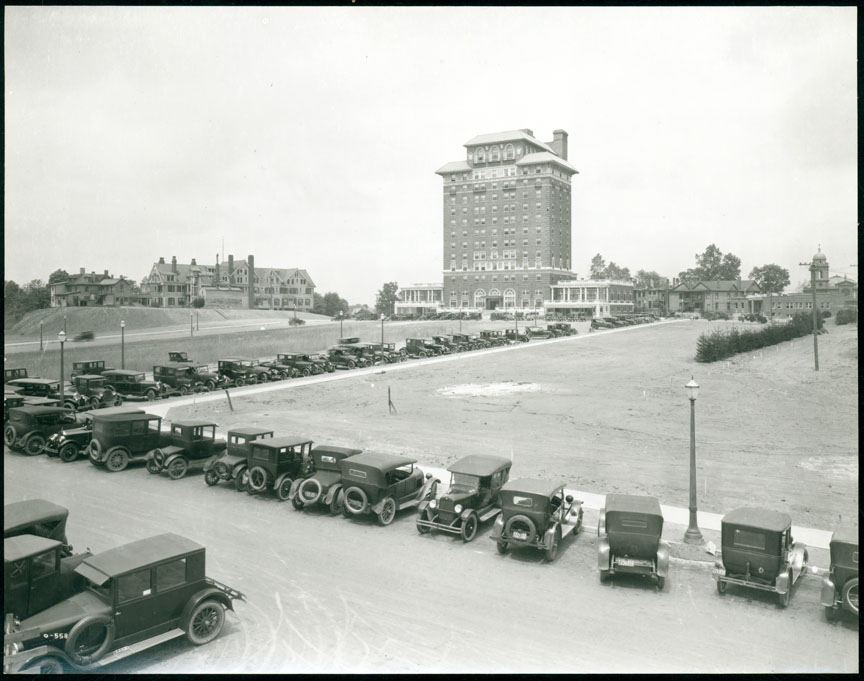On Nov. 20, 1919, The Asheville Citizen warned city drivers that the heyday of unregulated parking was nearing an end:
“The promiscuous parking of automobiles wherever it might suit the convenience of the owner or the driver, will no longer go unnoticed in Asheville by those who wear the badge and are under obligations to see that every law is enforced and that violators are brought before the court.”
With the announcement, all city parking problems were resolved, and everyone drove happily ever after. (Wait a second, that can’t be right!)
No, indeed congestion and parking complaints continued to make headlines long after the Nov. 20, 1919, declaration. In the summer of 1920, multiple articles described Church Street as a parking lot overflowed with stationary vehicles lining both sides.
By August, the city passed new regulations limiting when and where drivers could leave their cars. Unsatisfied with the measure, an editorial in The Sunday Citizen’s Aug. 29, 1920, edition advocated for the elimination of all downtown street parking. “Why should the city provide places in the streets for the prolonged parking of motors?” the piece asked. “The streets are intended for traffic, not for storage of vehicles.”
If residents insisted on driving themselves downtown, the paper continued, “Why should not the individual car owner provide his own parking place in the business district in the same way that the farmer provides a place for his wagon when he comes to town?”
Not all were on board with the newspaper’s proposal. In the same day’s print, resident Thomas Wadley Raoul questioned the city’s recent decision to prohibit parking on Patton Avenue. “The merchants on ‘the avenue’ want the parking,” Raoul wrote. “The drivers want the parking. The ladies shopping in motors want the parking. … But because the commissioners find it too much trouble to properly regulate traffic, the public is condemned to suffer. The public be damned.”
Downtown’s parking problems quickly factored into future construction plans. On Oct. 6, 1922, the paper reported E.W. Grove’s intention to develop the Battery Park property, creating new office and commercial buildings in the heart of downtown, as well as wide sidewalks and roads. “One of the principal reasons for the construction of these broad thoroughfares,” the paper explained, “is to afford ample parking space for the benefit of merchants … so that their customers will not be placed at the inconveniences and time of driving around several block before parking space can be found[.]”
In addition to Grove’s future plans, the city’s early parking woes also inspired more immediate entrepreneurial endeavors. “Leasing of parking space on the ‘honor system’ is the latest venture in Asheville,” the paper stated on April 20, 1924. According to the article, the business model’s success was a cause for celebration. “Those familiar with the unique venture, declare that it is the first of its kind and proves that human nature is for right when faced with the question of paying for anything or just ‘driving off.'”
However, other accounts suggest a lack of moral fiber among early motorists. An editorial in the Jan. 13, 1925, edition of The Asheville Citizen ran with the headline “Careless parking.” The piece lampooned local drivers for the selfish ways in which they disregarded the city’s rules and regulations, often occupying multiple spots with a single automobile. Not only did this waste space, the editorial decried, but it also forced other drivers to circle “many blocks because a minority of their neighbors never take thought of the other fellow’s rights.”
Such behavior, the article argued, was the result of the country’s long-standing philosophy that “taught us Americans to go every man for himself, contest, almost, for the devil to have the hindmost.” In consequence, the piece continued, “We have come near learning to believe that life cannot be successfully met in any other spirit, and that is one of the reasons why we have earned the title of a lawless people.”
Fortunately, a new order and promise were on the horizon. On June 16, 1925, The Asheville Citizen informed readers that the city of Boston announced plans to erect “a huge building with a floor area of nearly four and one-half acres, of which practically every foot will be devoted to car parking.”
Traffic experts, the article continued, “predict that in the near future it will be the rule to have buildings in which cars can be parked, for a reasonable charge, by business men who drive to their office and by women who are down town for an hour or more on shopping expeditions.”
Editor’s note: Peculiarities of spelling and punctuation are preserved from the original documents.



Before you comment
The comments section is here to provide a platform for civil dialogue on the issues we face together as a local community. Xpress is committed to offering this platform for all voices, but when the tone of the discussion gets nasty or strays off topic, we believe many people choose not to participate. Xpress editors are determined to moderate comments to ensure a constructive interchange is maintained. All comments judged not to be in keeping with the spirit of civil discourse will be removed and repeat violators will be banned. See here for our terms of service. Thank you for being part of this effort to promote respectful discussion.